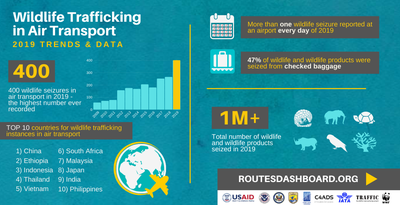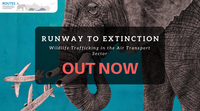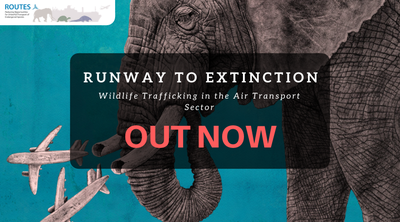Runway to Extinction: Airports and Airlines in Every Region of the World Can Assist with Fighting Wildlife Trafficking
Apr 15, 2020
A new analysis of wildlife trafficking seizures in air transport reveals the illegal wildlife trade to be truly global in scope, encompassing additional airport locations as each year goes by.
The report, Runway to Extinction: Wildlife Trafficking in the Air Transport Sector, produced by C4ADS as part of the USAID Reducing Opportunities for Unlawful Transport of Endangered Species (ROUTES) Partnership, details how traffickers operating in every populated region of the world rely on similar trafficking methods and utilize the same vulnerabilities within the air transport sector as traffickers of other illicit goods.
Runway to Extinction examines the trends, transit routes, and trafficking methods used by wildlife smugglers exploiting the aviation industry in six world regions: Africa, the Americas, Asia, Europe, the Middle East, and Oceania. The information in the report is complemented by the ROUTES Dashboard, which enables visitors to filter and view information on wildlife trafficking incidents in the air transport sector over the past ten years.
"This report highlights the widespread, pervasive nature of wildlife trafficking by air, with each major world region impacted. Our analysis shows that traffickers of all types exploit the same vulnerabilities within airports, often using the same trafficking methods to circumvent law enforcement and airport authorities. Furthermore, seizure data shows that many wildlife trafficking networks rely on the same smuggling methods over time, suggesting that a thorough understanding of airport-specific or country-specific trafficking patterns could be instrumental in reducing the air transport system's vulnerability to trafficking," said the report’s author Mary Utermohlen, Program Director at C4ADS.

In addition to contributing to the extinction of endangered species, threatening local livelihoods, and undermining regional and global security, illegal wildlife trade is a risk factor for the spread of zoonotic diseases. According to the Center for Disease Control, three out of every four new or emerging infectious diseases originate in animals. Many of the species seized in air transport—including live birds, live reptiles and mammals—are high risk carriers of zoonotic diseases and may end up in illegal or unregulated markets around the world.
“Faced with the current health crisis caused by the novel Covid-19 virus, the world is unfortunately grappling with the danger and economic turmoil that zoonotic diseases can pose. Trafficked wildlife present particular risks in this context,” said Michelle Owen, ROUTES Lead. “By training staff to detect and report wildlife trafficking and working with enforcement agencies to intercept wildlife traffickers, airports and airlines can help strengthen their operations and play a role in reducing the risk of future outbreaks.”
“Many airlines recognize the need to combat wildlife trafficking and are stepping up as leaders in this global effort. Airline staff spend more time with passengers and baggage than customs authorities and can provide a key source of intelligence for enforcement agencies,” said Jon Godson, Assistant Director of Environment at the International Air Transport Association (IATA).“Also, the rapid introduction of new technology in the sector presents an opportunity for public-private partnerships based on the smarter use of digital intelligence to apprehend wildlife traffickers.”
“Traffickers are increasingly abusing transport systems to move their products quickly and securely. During the journey from source to market, airports may be used in transit,” said Juliana Scavuzzi, Senior Manager of Environment at Airports Council International (ACI) World. “This provides airports with an important opportunity in preventing wildlife trafficking. ACI is committed to developing a framework to fight wildlife trafficking, and support our members with their efforts.”
The illegal trade of wildlife is the fourth largest black market in the world and impacts more than 7,000 species of animals and plants. Runway to Extinction is the most comprehensive assessment of wildlife trafficking in the air transport sector to date, and builds on the previous ROUTES reports, Flying Under the Radar (2017) and In Plane Sight (2018).
View the full report here: https://routespartnership.org/industry-resources/publications/runway-to-extinction-report
View the ROUTES Dashboard: http://www.routesdashboard.org/
Contact:
Hallie Sacks, TRAFFIC Communications Officer
hallie.sacks@traffic.org
###
About ROUTES
The USAID Reducing Opportunities for Unlawful Transport of Endangered Species (ROUTES) Partnership brings together government agencies, transportation and logistics industry companies and representatives, international conservation, development and law enforcement organizations and donors in order to disrupt wildlife trafficking activities, and forms a key element of the concerted international response to addressing wildlife poaching and associated criminal activities worldwide.
At the heart of ROUTES is a core group of partners collaborating with the U.S. Government and the transport sector that includes Airports Council International (ACI) the Center for Advanced Defense Studies (C4ADS), the International Air Transport Association (IATA), TRAFFIC and WWF. The Partnership is funded by USAID and coordinated by TRAFFIC. To learn more, visit routespartnership.org or follow @ROUTESPartners
About USAID
The United States Agency for International Development (USAID) is responsible for the majority of overseas development assistance from the United States Government and leads international development and humanitarian efforts to save lives, reduce poverty, strengthen democratic governance and help people on their journey to self-reliance. For more information please visit usaid.gov or follow @USAID on Facebook and Twitter.
About C4ADS
C4ADS is a nonprofit organization dedicated to providing data-driven analysis and evidence-based reporting on global conflict and transnational security issues. We use cutting-edge technologies to manage, integrate, and analyze disparate data from diverse languages, regions, and sources, incorporating our own field research from conflict zones and fragile states. We seek to engage with local and international audiences and produce compelling analysis on conflict and security issues. In doing so, we fill a critical gap left by traditional public sector and profit-driven institutions. For more information, visit c4ads.org or follow @C4ADS
About TRAFFIC
TRAFFIC, the wildlife trade monitoring network, is the leading non-governmental organization working globally on trade in wild animals and plants in the context of both biodiversity conservation and sustainable development. For more information, visit traffic.org or follow @TRAFFIC_WLTrade
About IATA
The International Air Transport Association (IATA) is the trade association for the world’s airlines, representing some 290 airlines or 82% of total air traffic. IATA supports many areas of aviation activity and helps formulate industry policy on critical aviation issues. For more information, visit IATA.org or follow@IATA2press
About ACI
Airports Council International (ACI), the trade association of the world’s airports, was founded in 1991 with the objective of fostering cooperation among its member airports and other partners in world aviation, including the International Civil Aviation Organization, the International Air Transport Association and the Civil Air Navigation Services Organisation. In representing the best interests of airports during key phases of policy development, ACI makes a significant contribution toward ensuring the global air transport system is safe, secure, efficient and environmentally sustainable. As of January 2018, provisional figures show that ACI serves 641 members operating 1,953 airports in 176 countries. For more information, visit aci.aero or follow @ACIWorld.


